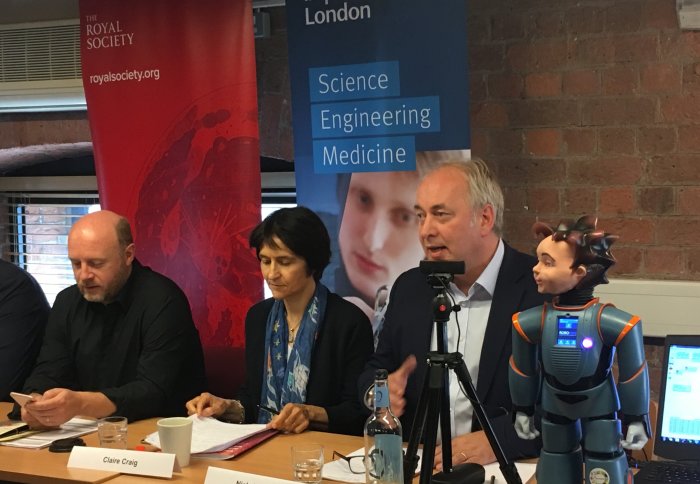Imperial showcases AI prowess to Conservative and Labour Party conferences
by Tom Rutland

Professor Nick Jennings (right) and Zeno speaking on the panel
Professor Nick Jennings, Zeno the robot and Dr Declan O’Regan met political leaders in Liverpool and Birmingham this month.
Vice-Provost (Research and Enterprise) Professor Nick Jennings spoke on a Royal Society panel at both party conferences, discussing artificial intelligence (AI), automation and the future of work. He was joined by Zeno, a robot that utilises AI to replicate the facial expressions of humans.
The panels, entitled ’How long until we have a robot for PM? Are the predictions about the future of work getting ahead of reality?’ featured speakers from academia, think tanks and MPs from both political parties.
Professor Jennings spoke about how he has seen waves of interest and disinterest in AI over his 30 years in the field, and gave a brief explanation to the audience of the differences between AI and machine learning. He outlined how most people and companies working with AI use it to build systems for narrowly defined tasks – such as what film recommendations to make based on what you’ve previously watched on Netflix.
AI will mainly augment what we do... humans and AI have complementary expertise Professor Nick Jennings
He argued that research shows that whilst AI will impact many of our daily activities at home, work and play, he saw it mainly as something that will augment what we do and change jobs, rather than wipe out entire workforces. The most exciting opportunities posed by the technologies, he said, were those that involved the complementary expertise of AI systems with human intelligence and creativity working in unison.
Professor Jennings gave a short demo of Zeno the robot, demonstrating how it uses machine learning to recognise and replicate facial expressions. Politicos were also treated to a video of Zeno mimicking the expressions of famous politicians.

At the Labour Conference, Shadow Digital Minister Liam Byrne referenced the upcoming 75th anniversary of the 1944 White Paper on Employment, where the government accepted one of their “primary aims and responsibilities” after the war was to be the “maintenance of a high and stable level of employment”.

He argued that, while it was difficult to know the speed at which automation will change the labour market, it is already clear that sectors including retail, transport and manufacturing will be the first to undergo significant change.
Byrne cited estimates that 2m jobs might be lost to AI and automation – five times that lost to the shutdown of the coal and steel industries – and called for policy interventions to prevent repeating the “mistakes of the past” that led to slow recoveries for communities dependent on coal and steel jobs.
The most important fringe at the party conference Robert Halfon MP
In Birmingham at the Conservative Party Conference, Education Select Committee Chair Robert Halfon described the event as “the most important fringe at the party conference ” as it was discussing “the most important issue facing the country”. He highlighted his Committee’s inquiry into the fourth industrial revolution – the effect of automation on jobs and productivity – which starts to hear evidence in Parliament from next week.
Halfon proposed that all young people should have a greater level of technical education, and said that the country needed to consider a broader curriculum up to the age of 18 – arguing that students shouldn’t be forced to choose between arts or sciences at A Level.

Calls for a parity of esteem between academic and vocational education are mistaken, Halfon argued. Instead, he said, they should be intertwined at every stage of education.
Dr Claire Craig, Director of Science Policy at the Royal Society, spoke about the importance of ensuring that social policy is agile enough to match the pace of technological advancement. She warned that a failure to seriously consider how to manage the disruption of the fourth industrial revolution could result in the economic gains being enjoyed only by those at the top, and not by ordinary workers.
Representatives from the Institute for the Future of Work, the Changing Work Centre Commission on Workers and Technology, the CBI and Brunswick Group also contributed to the debate.
Questions from the audience of party members, policy wonks and members of the public covered issues ranging from driverless cars to universal basic income.
Professor Jennings also recorded a video for JOE Politics on how he expects AI to develop and its potential future healthcare application.

Imperial’s Dr Declan O’Regan also made an appearance, talking about the latest developments in heart disease research to attendees at both conferences from the British Heart Foundation’s stall in the exhibition space. Dr O’Regan’s research, funded by BHF, uses AI to interpret heart scans and tests, with the hope of accurately predicting what will happen to people with heart failure so that they can receive the best possible treatment.
Imperial’s involvement in the party conferences comes hot on the heels of visits to the College by Environment Secretary Michael Gove and local MP Emma Dent Coad.

Imperial also hosted the launch of the Government’s AI Sector Deal in April, where the Business Secretary Greg Clark and then Digital Secretary Matt Hancock spoke alongside President Alice Gast.
Special thanks to Jie Shen for chaperoning Zeno at the party conferences.
Article text (excluding photos or graphics) © Imperial College London.
Photos and graphics subject to third party copyright used with permission or © Imperial College London.
Reporter
Tom Rutland
Communications and Public Affairs